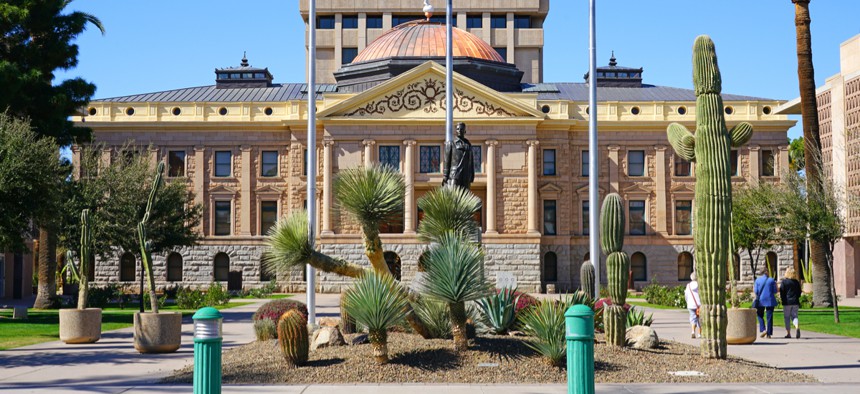Some Arizona Republicans Pushing a State Tax Hike for Education

Arizona State Capitol EQRoy/Shutterstock
STATE AND LOCAL ROUNDUP | Unemployment up in Illinois … Firefighters experiment with body cameras … What’s the future of the soda tax in Philadelphia?
For the first time in over a decade, some Republican lawmakers in Arizona are supporting a sales tax increase. The revenue from the hike would be earmarked for education, and would bring in an additional $400 million every year. "There is no greater priority for the future of our state than thoughtfully, flexibly and strategically funding Arizona’s schools," Kelli Ward, head of the state Republican Party, wrote in a op-ed supporting the plan. The tax hike would still have to be approved by voters on a 2020 ballot, and while Republican party leaders are supportive of it, not all legislators in the party feel the same. “I don’t know if my district is ready for another increase, even if it’s just to refer it to the ballot for a vote,” Republican Rep. Kelly Townsend said. On the other hand, Pennsylvania Republicans are backing expansion of a business tax credit that provides scholarships for students to attend private school. Meanwhile, lawmakers in Washington state (where Democrats are in the majority in both houses) passed a tax hike on Amazon and Microsoft to fund higher education and in Oregon a $1 billion tax plan for public schools won key committee approval and heads to the full House. [Arizona Capital Times; FOX 10 News Phoenix;]
SODA TAX STRUGGLES | Philadelphia’s soda tax has been one of the more divisive issues during Mayor Jim Kenney’s tenure. Now, the Philadelphia Inquirer has found that many City Council candidates for the May 21 primary election are opposed to the tax (although some of those in opposition say they wouldn’t scrap it without an alternative funding source). The tax, a signature item for the mayor, pays for pre-K programs and schools, as well as a program to improve parks and libraries. An effort to impose a 2-cent per fluid ounce tax on sugary beverages has been shelved in California, as soda taxes also failed this year in a number of other states. Many bills may fail at the state level due to pressure from American Beverage Association lobbyists, who spent over $1 million fighting the measure in California. [Philadelphia Inquirer; Governing; KJZZ; Kaiser Health News]
UNEMPLOYMENT | A new report indicates that joblessness is on the rise in Illinois, but state officials are arguing that the statistics are a good sign for local economies. The unemployment rate increased in 13 out of Illinois’ 14 biggest metro areas, with the Chicago area showing the only drop in unemployment. Officials noted that where unemployment increased, however, so did available jobs, as most counties created several thousand jobs in the past year. Earlier this month, the Economic Policy Institute reported that the black unemployment rate in Illinois, at 8.8%, is over twice that of the white unemployment rate, at 3.4%. Only Pennsylvania and the District of Columbia have higher black unemployment rates. [Illinois News Network; Public News Service]
BODY CAMERAS | Though police are more well known for wearing body cameras, firefighters in Sacramento are now experimenting with the digital tools. In an effort to provide better training, departments in the California city are now using body camera footage to improve their response to stressful rescues. They are also posting the footage online so that departments across the country can learn from their strategies. [CBS Sacramento]
MINIMUM WAGE | The Minnesota Senate passed a bill that would prevent localities from increasing their minimum wage above the state-set level, in a rebuke to Minneapolis, which set its own minimum wage at $15 two years ago. Republican leaders in the legislature say the measure is necessary to prevent a patchwork of local laws. Advocates for local laws note the difference in cost of living between major cities like Minneapolis and smaller towns throughout the state, where the minimum wage of $9.86 an hour for larger employers and $8.04 for smaller employers might be more appropriate. [Minneapolis St. Paul Business Journal; Pioneer Press]
Emma Coleman is the Assistant Editor at Route Fifty.
NEXT STORY: Teachers Earn Less Than Their Private-Sector Counterparts, Research Shows






